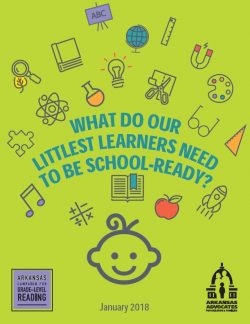
When do children begin to learn? Believe it or not, school readiness begins in the womb. Decades of research show the first few years of life, including the prenatal months, are the most important for healthy brain development and success in school. Unfortunately, too many of our kids aren’t getting the boost they need for their healthy growth and development, especially during the most critical developmental stage: the infant and toddler years.
In response to this issue, today the Arkansas Campaign for Grade-Level Reading (AR-GLR) and Arkansas Advocates for Children and Families (AACF) are releasing a new report, “What Do Our Littlest Learners Need to Be School-Ready?” This latest collaborative report focuses on a few factors that have the greatest impact on infants and toddlers’ school readiness, including:
- Good Health: Access to developmental and mental health screenings and treatment, as well as social-emotional learning;
- Positive Early Learning Experiences: Access to quality child care, Early Head Start, early interventions, and literacy activities between parents and their children; and
- Strong Families: Ongoing parent education, engagement, and support, including prenatal care and paid family leave.
The report also includes recommendations about how policymakers should prioritize programs that support families with infants and toddlers, as well as how these parents can help their young children develop a lifelong love of reading and learning from the beginning.
Improve Access to Screenings and Early Interventions for Infants and Toddlers
- Prioritize and provide incentives for early identification and prevention services.
- Ensure that screening tools are comprehensive and standardized across the systems.
- Strengthen systemwide care coordination and access to patient data.
- Improve support for the entire family and reward family engagement.
- Create a continuum of high-quality care with treatment delivered in the least restrictive setting.
Improve Early Childhood Education Quality and Coordination
- Provide funding incentives for research-based programs like Dolly Parton’s Imagination Library, Reach Out and Read, or other programs that help get books in the hands of kids from the very beginning.
Improve Early Childhood Education Quality and Coordination
- Gather data to better understand where young children are being served.
- Continue efforts to improve the quality of early childhood education programs for infants and toddlers.
- Serve more infants and toddlers through high-quality child care and Early Head Start.
- Encourage coordination of existing programs serving infants and toddlers.
Support Families During Their Children’s Earliest Years
- Create a continuum of effective, culturally-appropriate parent engagement from birth through the early elementary grades.
- Provide adequate funding for home visiting programs.
- Provide paid family leave for all families under 200 percent of the federal poverty line (FPL).
- Ensure that all families and their children have access to health insurance and quality care, including prenatal care and developmental and mental health screenings for infants and toddlers.
Click the download link to read the full report.
